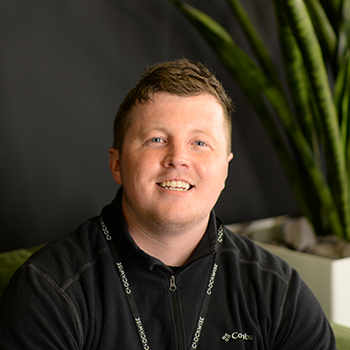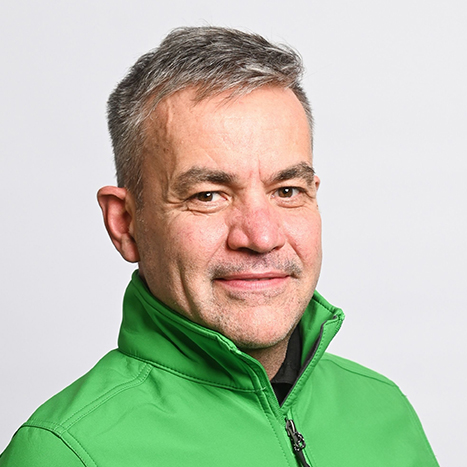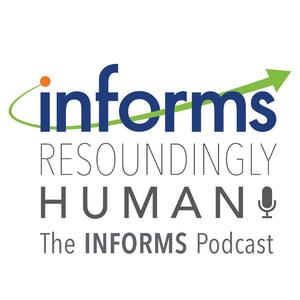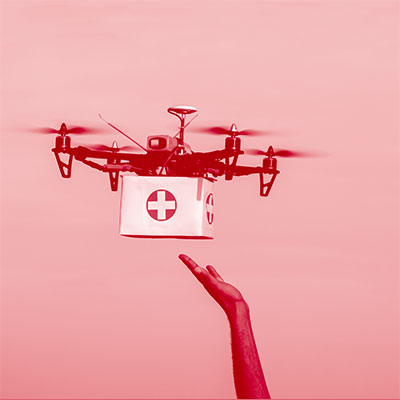Published: November 30, 2022

This week’s podcast is an incredible example of the power of O.R. and analytics to unite and empower people and communities across the globe, and I’m excited and honored to share this story with you! I’m joined by Andrew Wylie, a simulation consultant at Simul8 Corporation which develops simulation software to provide unique, evidence-based approaches to decision making, and William Taylor, head of operations at Shout-It-Now, which uses innovative approaches to provide South African communities with free sexual and reproductive health services. We’ll be discussing the unique partnership between these two organizations, which is leveraging O.R. and analytics to make a lasting impact and help save lives.
One of the main challenges that we had to addressed was the fact it’s a very emotive topic and we still wanted to approach the topic objectively with the amount of care required for it. So making sure we could separate that and still be extremely compassionate of course was a challenge that we wanted to address throughout the project.
Interviewed this episode:

Andrew Wylie
Simul8 Corporation
Andrew is a Simulation Consultant with a Masters in Business Analysis and Consulting. He’s been with Simul8 for three years, starting as an intern before joining the Support Team. Now, Andrew is part of the Simulation Excellence Team, delivering projects across multiple

Wiliam Taylor
Shout-It-Now
To date William has been instrumental in Shout-It-Now conducting over 1.3 million HIV tests.
William has 20+ year’s experience within Operations Research Science and management of complex operations in top-tier firms. A passionate senior leader who develops high performing team, through coaching and creating an environment where individuals and team can excel. An animal lover, William has served on the board of Animal Lifeline (Lost, Found, Homeless animals) where He developed the organization and mentored staff. William has held several management roles for various organizations including Shout-It-Now, Rentokil Initial, Open House Information Technology, and the Western Province Blood Transfusion Service.
Currently studying to complete the Haroun Education Ventures MBA Degree Program™, Williams background also includes extensive experience in Information Technology. He uses his diverse skills in business, organizational growth and IT to modernize operations and process, consistently exceeding expectation.
Related Episodes
Episode Transcript
This week’s podcast is an incredible example of the power of OR and analytics to unite and empower people and communities across the globe. And I’m excited and honored to share this story with you. I’m joined by Andrew Wylie, a simulation consultant at Simul8 Corporation, which develops simulation software to provide unique evidence based approaches to decision making. And William Taylor head of operations at Shout-It-Now, which uses innovative approaches to provide South African communities with free sexual and reproductive health services. We’ll be discussing the unique partnership between these two organizations, which is leveraging OR and analytics to make a lasting impact and help save lives. William, Andrew, thank you so much for joining me. Stories like this really are the reason I love working on this podcast so much.
Andrew Wylie:
Great to be here, Ashley. Thanks for having us.
William Taylor:
Right, great to be here. Thanks for having us Ashley.
Ashley Kilgore:
So William, can you start us off by sharing some more detail on the work Shout-It-Now is doing as well as your role there?
William Taylor:
Thank you Ashley. We are a nonprofit organization that encourages our clients to have bold communications about sex and relationships. We service our clients with gender based violence, sexual reproduction health and HIV tests. We funded by PEPFAR through CDC and we work very close with Department of Health in South Africa as well. Our main target clients are the girls between the age of 15-24 because they’re at the highest risk in South Africa for gender based violence and for HIV. So we actually have mobiles that go out into communities and we don’t call them clinics because we try to make them more funky and really attracting to the young girls and they’re very much technology driven. So we are quite paperless and we go to the areas where a lot of other people can’t get to and it’s hard to reach areas so that’s where we go, where our staff are also very young and really to appeal to the young age groups that we are looking at.
And we offer, as I said, HIV testing. We offer gender based violence, contraception. We also offer PrEP, which is an HIV prevention tablet that’s taken daily and all our services are offered in a non-judgmental private space and giving the client the choice to see what is really required for them. And my role in this is I’m head of operations and really need to make sure that a service can be delivered there, but at the same time I’m looking at how we can actually modernize our operations in the field to be more relevant to our clients and deliver much better client experience to them.
Ashley Kilgore:
So now could you describe some of the challenges associated with the work Shout-It-Now is doing?
William Taylor:
Yeah, sure. So as I said, we work in some of the tough areas and because we are preventative service as well, so it’s not something that necessarily everybody goes to clinics for, actually it makes it more difficult because it’s hard to reach areas. But there’s also at the moment still a lot of stigma around HIV, gender based violence. There’s also a lot of lack of knowledge and clients not knowing what risk they’re actually at in the moment and therefore don’t know necessarily they need some of the services. And unfortunately with that comes that actually puts pressure on our staff because sometimes it’s quite a few people that want to use our services. So they sometimes find you pressurized and rushed or this is what was happening.
And then we lost clients because clients would not want to wait around because it’s taking too long before they could actually come in to see our professional staff. So we’ve got nurses, social workers on the team that they actually can talk to. And what effect that actually had is our staff are very passionate about helping our clients, et cetera. So when they can’t do that, they become very demotivated, which obviously affects them in many ways.
Ashley Kilgore:
And now Andrew, how did Simul8 come to be involved with Shout-It-Now?
Andrew Wylie:
So Simul8 has had a longstanding relationship with Shout-It-Now. Many years ago we were able to help them double the amount of people able to be tested for HIV. And that relationship has continued throughout the years. Simul8 has got its own Tech for Good program, so we’re always keen to identify charities and different industries that are doing great work within the community where we can actually help them with the power of simulation. So we were very, very keen to help out with this project and it was thoroughly enjoyable.
Ashley Kilgore:
So Andrew, can you give us an idea how Simul8 has approached helping to tackle these unique challenges that William outlined earlier?
Andrew Wylie:
So first of all, myself and my colleague wanted to really get to know the client. It was very important to do so, to understand their goals, understand who we’re working with and what the needs that they had. One of the main challenges that we had to address was the fact it’s a very emotive topic and we still wanted to approach the topic objectively with the amount of care required for it. So kind of making sure that we could separate that and still being extremely compassionate, of course. It was a challenge that we wanted to address throughout the project. One of the other main challenges we had to address was the data analysis involved. Of course within the topic itself, we’ve got a lot of people coming into their services from different age groups, different communities and different genders. And ultimately analysis of the large data set led us to realize that by age group, by gender and by community and by analysis of that we could see that there was different outcomes and therefore different requirements and it was very important to take that into account.
So before we really got anything into the actual simulation, we had to understand the pathways and subsequently the requirements of the different people based on these factors. So that was something we had to focus on. Another challenge was obviously making it engaging for Shout-It-Now so that in the future they could make changes themselves, which again leads to the idea of putting the power of simulation into their hands. So what we wanted to do was create a dashboard so that any levers they wanted to change were easy to make and if they didn’t need to focus on what was happening too much in the background, we wanted to make it engaging. We wanted to make it easy to use. That interface was key, just as key as actually getting the model kind of fundamentally correct and the data correct. So that was another challenge and ultimately we were able to get success by addressing these main factors.
Ashley Kilgore:
So now as I mentioned in my opening, this really is an example of an incredible global effort with stakeholders in the UK and South Africa and I’m sure there are many others in between. How does it feel for each of you to be involved in work like this, Andrew, to be helping with such an important mission on a completely different continent and William to have support coming from across the globe?
Andrew Wylie:
So it’s extremely fulfilling to start with, obviously an incredible job that the guys at Shout-It-Now are doing. Very emotive topic, so being able to help with that, as I say, brought an awful lot of satisfaction, of course as well from a technical perspective, it was a very challenging project, a lot of data layered within it. So it got to couple that kind of level of challenge as well as doing something that was for the better, for creating a better world.
William Taylor:
And I think from our side it’s being for us, what we liked about working with Simul8 is that they didn’t just provide the process, but they looked to understand our process, what current process is, looked to understand our landscape, our clients, so that we could come up together with something that actually is a joint vision that’s got our client in the center, which is what we aim for and see how our staff can benefit by making a few changes. And to me has been such a joy being helped by somebody like Simul8 that is recognized in the industry to work to better lives of other people in it. And coming from working in a public health sector, having somebody from the private sector willing to do this and actually help us to modernize our service delivery is just phenomenal and really, I can’t say much more.
Ashley Kilgore:
So can you give us an idea of what the impact of the partnership has been so far?
William Taylor:
Yeah, definitely. I mean as Andrew mentioned, we’ve actually had quite a longstanding in relationship with Simul8 and they were very instrumental in developing some of our models and the work we’ve done gave us clear view of where some of our bottlenecks were, some of our issues were that we had to work with. And working with them, we came up with some ideas how we could do it, some short term changes, some longer term changes, and to us very cost effective ways of doing things as well. And it’s not just saying, okay, throw money at it and get it. It was really cost effective ways that we could actually streamline things.
And in the month that we’ve run with some of the changes, now we’ve already had about a 33% increase in productivity. So that is huge for us. And it didn’t just affect our direct operations, which we knew it would affect our prep in that, but it affected things like GBV as well. We’ve had increase in case identification about 30% and we attribute this to clients not having to wait as long. So we had clients who were probably waiting that then would leave because they didn’t know about internet. And to us it’s just been phenomenal.
Ashley Kilgore:
So now to follow up on that, what are your hopes for the future?
William Taylor:
Well I think as I said, we’ve got some longer term things we’ve picked up from that as well. And one of the big things that’s coming that we are working on from what we learned from this as well is we are actually designing a new truck that will give us more space like we needed, et cetera based on the feedback we got. And that will address some of the gaps that we had and it’ll actually give us able to see more clients and help more people in the communities, which obviously means a lot. And working with Simul8, there’re different ways we can look at some of the other processes we spoke about as well. So I think it could be a continuous relationship and keep developing together.
Ashley Kilgore:
Now as we prepare to wrap up, I’d love to have each of you share what you hope the biggest takeaway is for listeners of today’s episode.
Andrew Wylie:
Yeah, I can start with that. Ultimately Simul8 here to bring the power of simulation to anyone regardless of the size of the organization, regardless of what that organization is trying to achieve. We are keen to continue our Tech for Good program and bring our skills across the world, across all disciplines and make the world a better place with the power of simulation and operational science.
William Taylor:
Yeah, I think from my point of view, we are in the business of changing people’s lives for the better. And the work we’ve done with Simul8 has given us the incentive to even work more at that and provide clients with more time where they can discuss their lifestyle needs, discuss what they need to improve their lives, which to us is nothing you can say with price about that. And to us it means such a lot what Simul8 has done for us and we hope that they set examples for other private organizations to actually realize the good they can do with organizations like us that do good for the people.
Ashley Kilgore:
William, Andrew, thank you again both so much for joining me. It’s really been a pleasure learning about the partnership between your two organizations and the incredible work you’re doing. So thank you.
William Taylor:
Thank you.
Andrew Wylie:
Thank you.
Ashley Kilgore:
Want to learn more? Visit resoundinglyhuman.com for additional information on this week’s episode and guest. The podcast is also available for download or streaming from Apple Podcasts, Google Play, Stitcher, and Spotify. Wherever you listen, if you enjoy Resoundingly Human, please be sure to leave a review to help spread the word about the podcast. Until next time, I’m Ashley Kilgore and this is Resoundingly Human.
Want to learn more? Check out the additional resources and links listed below for more information about what was discussed in the episode.
Tags: AIDS, health services, healthcare access, HIV, Shout-It-Now, SIMUL8



